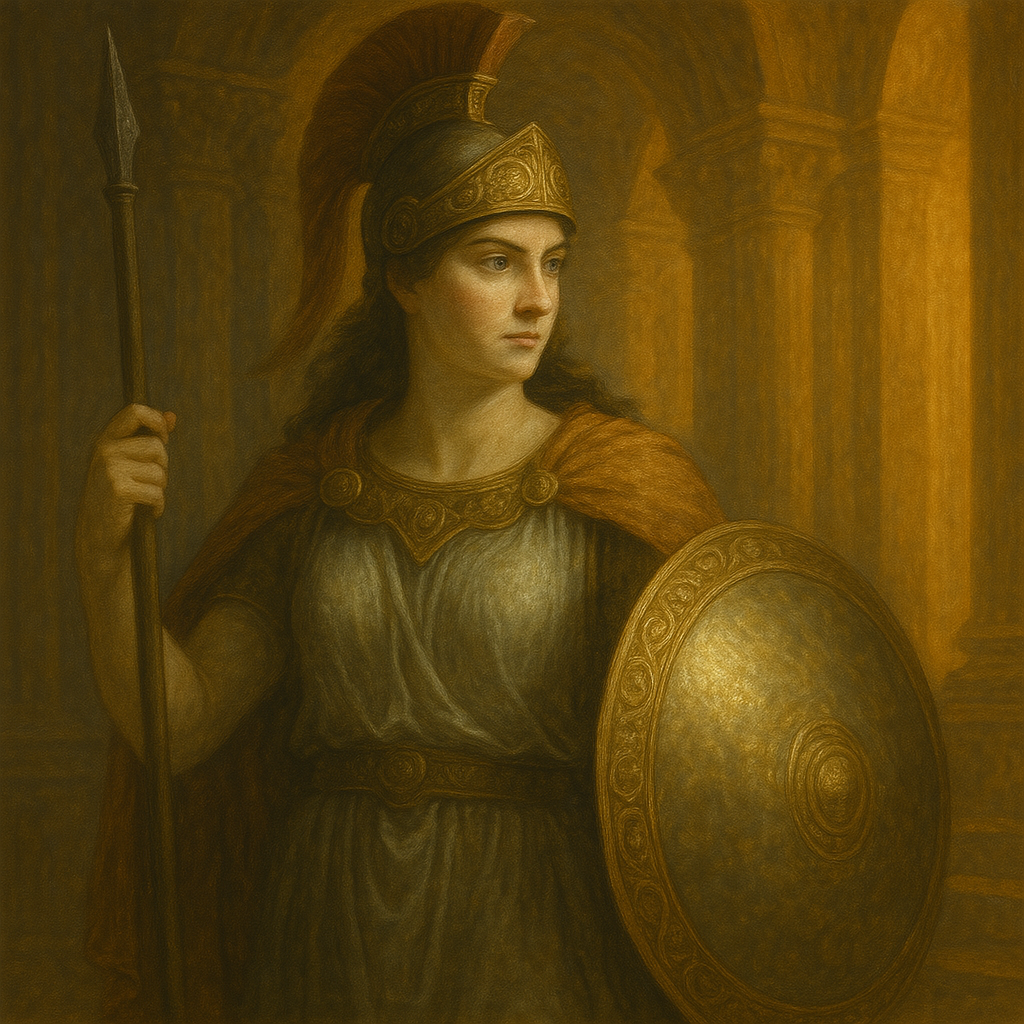Overview
Athena, known to the Romans as Minerva, is the Greek goddess of wisdom, strategy, justice, arts, and heroic warfare. One of the most revered deities in the Greek pantheon, Athena represents rational intelligence, strategic planning, civic responsibility, and divine insight. Unlike Ares, who embodies chaotic and emotional combat, Athena governs disciplined warfare, diplomacy, and the wisdom needed to lead and protect. She is also a patron of artisans, inventors, philosophers, and city-builders—especially revered in Athens, the city named in her honor.
Origins and Mythological Role
Athena holds a unique place in mythology due to her miraculous birth: she sprang fully grown and armored from the forehead of Zeus, after he swallowed her mother, Metis (the Titaness of wisdom). This unusual birth story symbolizes Athena’s embodiment of divine intellect, balance between mind and strength, and sovereignty over both masculine and feminine power.
As a virgin goddess (one of the three along with Artemis and Hestia), Athena chose clarity and independence over romantic entanglement. She is a guiding figure for heroes, cities, and leaders seeking justice and insight.
Symbols and Iconography
Athena is often depicted as a majestic, armored woman exuding calm authority and strategic precision.
Common Symbols
- Owl – Emblem of wisdom, insight, and the ability to see through darkness
- Olive Tree – Symbol of peace, prosperity, and divine diplomacy (gifted by Athena to Athens)
- Aegis – A protective cloak or shield, often adorned with the head of Medusa, signifying protection and righteous fear
- Helmet and Spear – Representing her warrior aspect, always strategic and purposeful
- Shield – Used not for aggression, but for defending justice and order
- Gorgoneion – The face of Medusa, worn on armor or shields as a talisman of power
She is frequently shown:
- In a flowing robe or battle armor
- Calm, collected, and composed, even in times of conflict
- Often accompanied by an owl or standing beside an olive tree or pillar
Attributes and Powers
1. Goddess of Wisdom and Intellect
Athena embodies clear thinking, rationality, and problem-solving. She guides scholars, teachers, and inventors—those who seek knowledge with humility and purpose.
2. Strategic Warfare and Heroic Guidance
Unlike Ares, who personifies brute force, Athena supports tactical warfare, emphasizing planning, leadership, and moral causes. She often assists heroes like Odysseus, Perseus, and Heracles, offering clever solutions and divine support.
3. Patroness of Civilization and the Arts
Athena nurtures cities, crafts, and structures of society. She is the guardian of civic law, justice, weaving, metallurgy, and practical inventions. As the founder of Athens, she embodies the ideal of wisdom guiding democracy.
4. Champion of Justice and Balance
Athena represents fair judgment, ethical decision-making, and wise leadership. She presides over councils and courts, offering clarity in disputes and guiding toward peaceful resolutions.
Key Myths and Stories
The Naming of Athens
Athena competed with Poseidon to become the patron of a new city. Poseidon offered a saltwater spring (or warhorse), while Athena gifted the olive tree—a symbol of peace and prosperity. The people chose Athena’s gift, and the city was named Athens in her honor.
The Birth of Athena
Zeus, fearing a prophecy that his child would surpass him in wisdom, swallowed Metis while she was pregnant. Later, Zeus experienced a terrible headache, and Hephaestus split his head open, from which Athena emerged, fully grown and armored—a symbolic birth of conscious intellect.
Arachne and the Art of Weaving
The mortal woman Arachne, a skilled weaver, boasted that her work was superior to Athena’s. Offended by her hubris, Athena challenged her to a weaving contest. Though Arachne’s work was flawless, she was punished for her arrogance and turned into a spider, destined to weave forever—an allegory for pride, artistry, and divine justice.
Temples and Worship
The Parthenon (Athens)
Athena’s most famous temple, the Parthenon, stands atop the Acropolis of Athens, symbolizing her guardianship over the city. A massive statue of Athena Parthenos (the Virgin) once stood within, made of gold and ivory by the sculptor Phidias.
Other Sacred Sites
- Delphi and Sparta – Where she was honored in various aspects, from protector of warriors to goddess of counsel
- Lindos (Rhodes) – A major temple site where Athena was revered as a sky and wisdom deity
Festivals
- Panathenaea – An elaborate festival celebrating Athena with athletic games, music, poetry, and a grand procession, including offerings of specially woven robes and sacred artifacts
Spiritual and Archetypal Significance
Athena is a guiding force for:
- Wisdom, truth-seeking, and critical thinking
- Civic leadership, diplomacy, and justice
- Disciplined creativity and innovation
- Balancing intellect with intuition
- Self-reliance and strategic action
In psychological and spiritual contexts, Athena represents the Wise Woman Archetype, offering clear-sighted discernment, independence, and rational strength. She aids those who seek to:
- Lead with integrity
- Make empowered decisions
- Uphold fairness, clarity, and higher truth
Conclusion
Athena is the embodiment of wisdom in action—the protector of cities, the defender of just causes, and the patron of intellect and creativity. Her presence invites us to balance strength with understanding, to lead with reason and courage, and to face life’s battles not with brute force, but with grace, insight, and principle. As both strategist and sage, warrior and weaver, Athena continues to inspire those who walk the path of purposeful wisdom and empowered thought.

